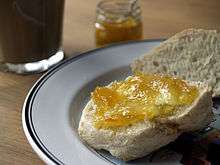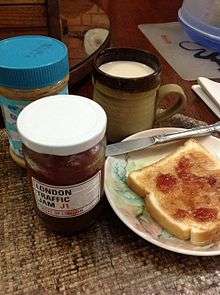Definify.com
Webster 1913 Edition
Jam
Jam
(jăm)
, Noun.
[Per. or Hind.
jāmah
garment, robe.] A kind of frock for children.
Jam
,Verb.
T.
[
imp. & p. p.
Jammed
(jămd)
; p. pr. & vb. n.
Jamming
.] [Either fr.
jamb
, as if squeezed between jambs
, or more likely from the same source as champ
See Champ
.] 1.
To press into a close or tight position; to crowd; to squeeze; to wedge in; to cram;
as, rock fans
. jammed
the theater for the concertThe ship . . .
jammed
in between two rocks. De Foe.
2.
To crush or bruise;
as, to
. jam
a finger in the crack of a door[Colloq.]
3.
(Naut.)
To bring (a vessel) so close to the wind that half her upper sails are laid aback.
W. C. Russell.
Jam
,Noun.
1.
A mass of people or objects crowded together; also, the pressure from a crowd; a crush;
as, a
jam
in a street; a jam
of logs in a river.2.
An injury caused by jamming.
[Colloq.]
Jam
,Noun.
[Prob. fr.
jam
, v.; but cf. also Ar. jamad
ice, jelly, jāmid
congealed, jamd
congelation, ice.] A preserve of fruit boiled with sugar and water; also called
jelly
; as, raspberry
jam
; currant jam
; grape jam
.Webster 1828 Edition
Jam
JAM
,Noun.
1.
A kind of frock for children.JAM
, v.t.1.
To press; to crowd; to wedge in.2.
In England, to tread hard or make firm by treading, as land by cattle.JAM
Definition 2025
jam
jam
English

Marmalade, a type of jam, spread on a piece of bread

A "London Traffic Jam" strawberry jam and peanut butter sandwich
Noun
jam (countable and uncountable, plural jams)
- A sweet mixture of fruit boiled with sugar and allowed to congeal. Often spread on bread or toast or used in jam tarts.
- (countable) A difficult situation.
- 1928, Upton Sinclair, Boston
- It's a blackmail ring, and the district attorneys get a share of the loot. […] Well, they got him in the same kind of jam, and soaked him to the tune of three hundred and eighty-six thousand.
- 1975, Bob Dylan, Tangled Up in Blue
- She was married when we first met
- Soon to be divorced
- I helped her out of a jam, I guess
- But I used a little too much force.
- 1928, Upton Sinclair, Boston
- (countable) Blockage, congestion.
- A traffic jam caused us to miss the game's first period.
- a jam of logs in a river
- (countable, popular music) An informal, impromptu performance or rehearsal.
- (countable, by extension) An informal event where people brainstorm and collaborate on projects.
- We came up with some new ideas at the game jam.
- (countable, baseball) A difficult situation for a pitcher or defending team.
- He's in a jam now, having walked the bases loaded with the cleanup hitter coming to bat.
- (countable, basketball) A forceful dunk.
- (countable, roller derby) A play during which points can be scored.
- Toughie scored four points in that jam.
- (climbing, countable) Any of several maneuvers requiring wedging of an extremity into a tight space.
- I used a whole series of fist and foot jams in that crack.
- (Britain, slang) luck.
- He's got more jam than Waitrose.
Synonyms
Derived terms
terms derived from jam (noun)
|
|
See also
Translations
sweet mixture of fruit boiled with sugar
|
|
blockage, congestion
|
impromptu informal performance
|
difficult situation
Verb
jam (third-person singular simple present jams, present participle jamming, simple past and past participle jammed)
- To get something stuck in a confined space.
- My foot got jammed in a gap between the rocks.
- Her poor little baby toe got jammed in the door.
- I jammed the top knuckle of my ring finger.
- To brusquely force something into a space; cram, squeeze.
- They temporarily stopped the gas tank leak by jamming a piece of taffy into the hole.
- The rush-hour train was jammed with commuters.
- To cause congestion or blockage. Often used with "up"
- A single accident can jam the roads for hours.
- To block or confuse a broadcast signal.
- (baseball) To throw a pitch at or near the batter's hands.
- Jones was jammed by the pitch.
- (music) To play music (especially improvisation as a group, or an informal unrehearsed session).
- To injure a finger or toe by sudden compression of the digit's tip.
- When he tripped on the step he jammed his toe.
- (roller derby) To attempt to score points.
- Toughie jammed four times in the second period.
- (nautical) To bring (a vessel) so close to the wind that half her upper sails are laid aback.
- (Can we find and add a quotation of W. C. Russell to this entry?)
- (Canada, informal) To give up on a date or some joint endeavour; stand up, chicken out, jam out.
Synonyms
Derived terms
Translations
to get something stuck in a confined space
to force something into a space
to cause congestion or blockage
|
|
to block or confuse a broadcast signal
baseball: to throw a pitch at or near the batter's hands
|
music: to improvise as a group
to injure a finger or toe by sudden compression of its tip
roller derby: to attempt to score points
Etymology 2
Persian or Hindi, meaning "garment, robe"; related to pajamas.
Noun
jam (plural jams)
Etymology 3
Noun
jam (plural jams)
- (mining) Alternative form of jamb
Albanian
Etymology
From Proto-Albanian *es-mi, from Proto-Indo-European *h₁ésmi (“I am, I exist”), identical with Ancient Greek εἰμί (eimí), Sanskrit अस्मि (ásmi), English am. Aorist qeshë from Proto-Indo-European *kwel- (“to turn, revolve”), with a semantic development similar to Germanic *werdan (“to become”), from Proto-Indo-European *wert- (“to turn”)[1].
Pronunciation
- IPA(key): /jam/
Verb
jam (first-person singular past tense qeshë, participle qenë)
- to be
Conjugation
conjugation of jam
| participle (pjesorja) |
qenë | ||||||
|---|---|---|---|---|---|---|---|
| gerund — present (përcjellorja — koha e tashme) |
duke qenë | ||||||
| gerund — past (përcjellorja — koha e kryer) |
duke pasë qenë | ||||||
| infinitive (paskajorja) |
për të qenë | ||||||
| singular (numri njëjës) |
plural (numri shumës) |
||||||
| 1st person (veta e parë) |
2nd person (veta e dytë) |
3rd person (veta e tretë) |
1st person (veta e parë) |
2nd person (veta e dytë) |
3rd person (veta e tretë) |
||
| indicative (mënyra dëftore) |
unë | ti | ai/ajo | ne | ju | ata/ato | |
| present (koha e tashme) |
jam | je | është | jemi | jeni | janë | |
| imperfect (koha e pakryer) |
isha | ishe | ishte | ishim | ishit | ishin | |
| simple past (koha e kryer e thjeshtë) |
qeshë | qe | qe | qemë | qetë | qenë | |
| perfect (koha e kryer) |
kam qenë | ke qenë | ka qenë | kemi qenë | keni qenë | kanë qenë | |
| pluperfect (koha e kryer e tejshkuar) |
pata qenë | pate qenë | pati qenë | patëm qenë | patët qenë | patën qenë | |
| future (koha e ardhme) |
do të jem | do të jesh | do të jetë | do të jemi | do të jeni | do të jenë | |
| future perfect (koha e ardhme e përparme) |
do të kem qenë | do të kesh qenë | do të ketë qenë | do të kemi qenë | do të keni qenë | do të kenë qenë | |
| subjunctive (mënyra lidhore) |
unë | ti | ai/ajo | ne | ju | ata/ato | |
| present (koha e tashme) |
të jem | të jesh | të jetë | të jemi | të jeni | të jenë | |
| past (koha e pakryer) |
të isha | të ishe | të ishte | të ishim | të ishit | të ishin | |
| perfect (koha e kryer) |
të kem qenë | të kesh qenë | të ketë qenë | të kemi qenë | të keni qenë | të kenë qenë | |
| pluperfect (koha e kryer e tejshkuar) |
të kisha qenë | të kishe qenë | të kishte qenë | të kishim qenë | të kishit qenë | të kishin qenë | |
| conditional (mënyra kushtore) |
unë | ti | ai/ajo | ne | ju | ata/ato | |
| present (koha e tashme) |
do të isha | do të ishe | do të ishte | do të ishim | do të ishit | do të ishin | |
| perfect (koha e kryer) |
do të kisha qenë | do të kishe qenë | do të kishte qenë | do të kishim qenë | do të kishit qenë | do të kishin qenë | |
| optative (mënyra dëshirore) |
unë | ti | ai/ajo | ne | ju | ata/ato | |
| present (koha e tashme) |
qofsha | qofsh | qoftë | qofshim | qofshit | qofshin | |
| perfect (koha e kryer) |
paça qenë | paç qenë | pastë qenë | paçim qenë | paçit qenë | paçin qenë | |
| admirative (mënyra habitore) |
unë | ti | ai/ajo | ne | ju | ata/ato | |
| present (koha e tashme) |
qenkam | qenke | qenka | qenkemi | qenkeni | qenkan | |
| imperfect (koha e pakryer) |
qenkësha | qenkëshe | qenkësh | qenkëshim | qenkë**** | qenkëshin | |
| perfect (koha e kryer) |
paskam qenë | paske qenë | paska qenë | paskemi qenë | paskeni qenë | paskan qenë | |
| pluperfect (koha e kryer) |
paskësha qenë | paskëshe qenë | paskësh qenë | paskëshim qenë | paskë**** qenë | paskëshin qenë | |
| imperative (mënyra urdhërore) |
— | ti | — | — | ju | — | |
| ji | jini | ||||||
Related terms
References
- ↑ Orel, Vladimir (1998), “jam”, in Albanian Etymological Dictionary, Leiden, Boston, Köln: Brill, page 156
Dutch
Pronunciation
- IPA(key): [ʒɛm]
Noun
jam m (plural jams, diminutive jammetje n)
- jam (conserved fruits where no parts of fruits are visible anymore)
Related terms
- konfituur
- marmelade
Latgalian
Pronoun
jam m
- (third-person singular) dative form of jis.
- Vys jam nazkas natai. 'It's never good enough for him. (He's never satisfied.)'
- Es jam atsaceju par reizi. 'I replied to him right away.'
- Jam daguoja laistīs paceli nu sātys. 'He had to leave his home.'
Latin
Adverb
jam (not comparable)
- Alternative form of iam
References
- jam in Charlton T. Lewis and Charles Short (1879) A Latin Dictionary, Oxford: Clarendon Press
Lithuanian
Pronoun
jam m
- (third-person singular) dative form of jis.
- 2007, Jurga (Jurga Šeduikytė), Angelai
- Jo balti sparnai man tinka
- Jam savo šarvus dovanoju
- His white wings suit me
- I present to him my armor
- 2007, Jurga (Jurga Šeduikytė), Angelai